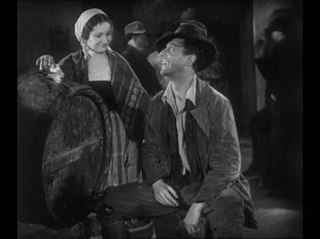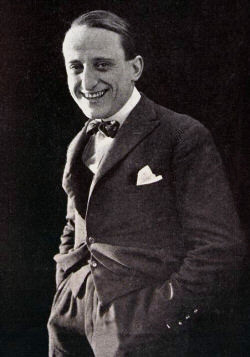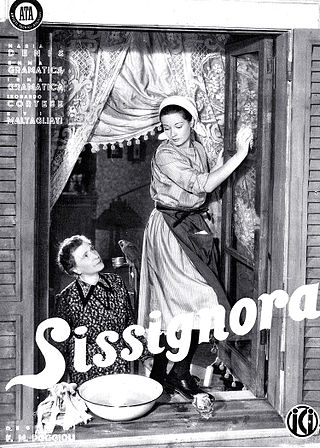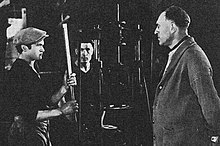
Alessandro Blasetti was an Italian film director and screenwriter who influenced Italian neorealism with the film Quattro passi fra le nuvole. Blasetti was one of the leading figures in Italian cinema during the Fascist era. He is sometimes known as the "father of Italian cinema" because of his role in reviving the struggling industry in the late 1920s.
Censorship in Italy applies to all media and print media. Many of the laws regulating freedom of the press in the modern Italian Republic come from the liberal reform promulgated by Giovanni Giolitti in 1912, which also established universal suffrage for all male citizens of the Kingdom of Italy. Many of these liberal laws were repealed by the Mussolini government already during the first years of government.
Ivo Perilli was an Italian screenwriter. He wrote for more than 50 films between 1933 and 1977.

Odessa in Flames is a 1942 Italian-Romanian propaganda war film directed by Carmine Gallone and starring Maria Cebotari, Carlo Ninchi and Filippo Scelzo. The film is about the Battle of Odessa in 1941, where the city was taken in an operation that was primarily conducted by Romanian forces and elements of the German Army's 11th Army.

Sun is a 1929 Italian silent drama film directed by Alessandro Blasetti and starring Marcello Spada, Vasco Creti and Dria Paola. The film was set around the planned draining of the Pontine Marshes by Benito Mussolini's Fascist government. It was shot partly on location, which added a sense of realism. Mussolini was impressed by the result and described it as "the dawn of the Fascist film".

Under the Southern Cross is a 1938 Italian drama film directed by Guido Brignone and starring Antonio Centa, Doris Duranti and Enrico Glori. The film is set in Italian-occupied Abyssinia following the recent Italian victory there. It was one of a sequence of eight films set in Italy's African Empire during the Fascist era that were released between 1936 and 1939. The film is a propaganda piece designed to support Fascist policy on empire and concerns about inter-racial romances.
The Charmer is a 1931 Italian comedy film directed by Guido Brignone and starring Armando Falconi, Tina Lattanzi and Ada Dondini. It is part of the White Telephone genre of films. It was shot at the Cines Studios in Rome.

Seconda B is a 1934 Italian comedy film directed by Goffredo Alessandrini and starring Sergio Tofano, Dina Perbellini and María Denis. It was screened at the Venice Film Festival where it was awarded a prize. It started a trend for "schoolgirl comedies" during the Fascist era, targeted primarily at girls and young women audiences. The title itself refers to a school class. The film is set in the early 1910s.

Mother Earth is a 1931 Italian drama film directed by Alessandro Blasetti and starring Leda Gloria, Sandro Salvini and Isa Pola. It was made at the Cines Studios in Rome. Along with Blasetti's other early films, it shows a strong influence of Soviet-style realism. A country landowner decides to sell up and move to the city, but later has a change of heart. It was part of Fascist Italy's promotion of rural over urban values.

Stefano Pittaluga was an Italian film producer, one of several figures who helped revive Italian film production in the late 1920s and early 1930s.

The Innkeeper is a 1944 Italian historical comedy film directed by Luigi Chiarini and starring Luisa Ferida, Armando Falconi and Osvaldo Valenti. The film is an adaptation of Carlo Goldoni's 1753 play The Mistress of the Inn, one of a number of times the work has been turned into films. It belongs to the movies of the calligrafismo style.

Carlo Campogalliani was an Italian screenwriter, actor and film director. Campogalliani directed around eighty films during his career and acted in another fifty. He directed the 1934 sports film Stadio. He was married to the actress Letizia Quaranta who appeared in several of his films.
Lost in the Dark is a 1914 Italian silent drama film directed by Nino Martoglio and starring Giovanni Grasso Sr., Maria Carmi and Virginia Balestrieri. Documenting life in the slums of Naples, it is considered a precursor to the Italian neorealism movement of the 1940s and 1950s. The only known surviving copy of this film was destroyed by Nazi German forces during World War II. The film is based on a 1901 play of the same title by Roberto Bracco.
Tortured Soul is a 1919 Italian silent film directed by Mario Caserini and starring Maria Jacobini, Andrea Habay and Alberto Collo. Alessandro Blasetti, a leading Italian director of the Fascist era, had his first contact with filmmaking by appearing as an extra.

The Materassi Sisters is a 1944 Italian comedy film directed by Ferdinando Maria Poggioli and starring Emma Gramatica, Irma Gramatica and Olga Solbelli. The film is an adaptation of the 1934 novel of the same title by Aldo Palazzeschi. It was shot at the Cinecittà Studios in Rome.

The Società Italiana Cines is a film company specializing in production and distribution of films. The company was founded on 1 April 1906.

Yes, Madam is a 1942 Italian romance film directed by Ferdinando Maria Poggioli and starring María Denis, Leonardo Cortese and Emma Gramatica. It was shot at the Cinecittà Studios in Rome. The films sets were designed by the art director Fulvio Jacchia.

The Peddler and the Lady is a 1943 Italian comedy film directed by Mario Bonnard and starring Aldo Fabrizi, Caterina Boratto and Anna Magnani.

La Wally is a 1932 Italian musical drama film directed by Guido Brignone and starring Germana Paolieri, Isa Pola and Carlo Ninchi. It is an adaptation of the 1892 opera La Wally by Alfredo Catalani. It was shot at the Cines Studios in Rome. The film's sets were designed by the art directors Gastone Medin and Ivo Perilli.

Ente Nazionale Industrie Cinematografiche (ENIC) was an Italian film production and distribution entity that operated between 1935 and 1956.















